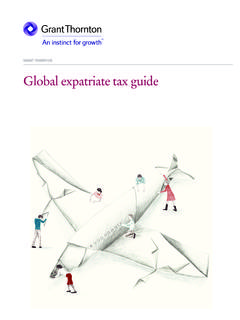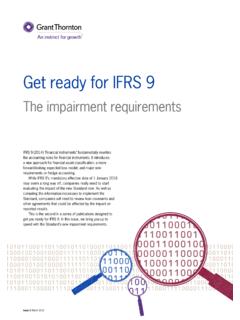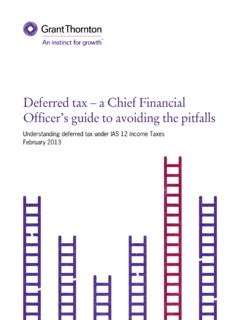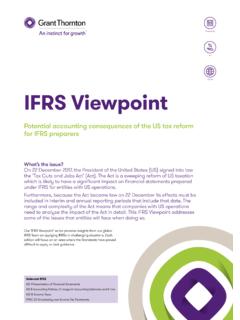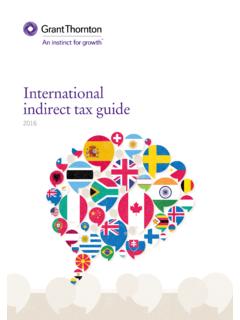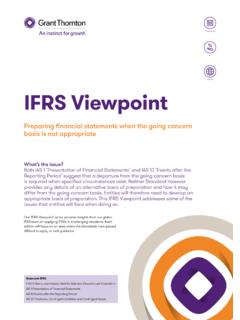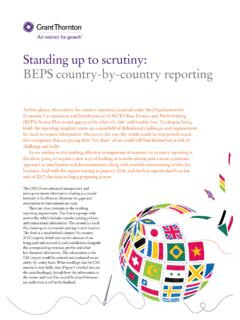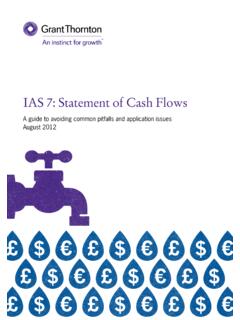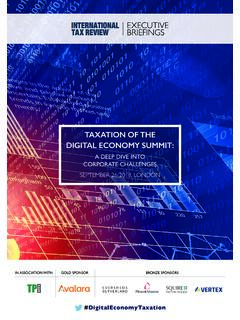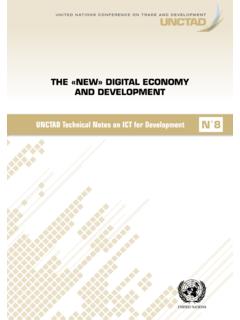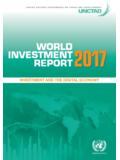Transcription of Taxing the digital economy - grantthornton.global
1 Taxing the digital economyLack of international consensus creates vacuum of uncertainty Commerce is increasingly digital . Yet, the global tax system is still geared to the needs of a traditional bricks and mortar economy . The OECD s Base Erosion and Profit Sharing (BEPS) Action Plan recognises the need for modernisation and has achieved quite a lot since the issue of its reports in October 2015. However, specific recommendations on digital taxation have been limited and the OECD s calls for an international consensus on the way forward have so far been unheeded. Individual countries are filling the vacuum with their own varied set of tax measures, which continues to create uncertainty and heightens the risk and complexity of tax management for multinational enterprises (MNEs).
2 And while it s the internet giants that the media and tax authorities have in their sights, it s also small and mid-size MNEs that are likely to bear the brunt of the changes and face the greatest challenges in managing them. So, what s coming up on the horizon and how can your business deal with the implications?NavigatingTa xDigitalCan the tax authorities keep up? One-click and a product is on its way. Yet in the age of digitisation and globalisation, the product could be coming from a country anywhere in the world. Traditional definitions of products and services are also being challenged, with market disruptors finding new ways to deliver traditional offerings. In addition, the ways in which value is defined, generated and exchanged are also changing in areas such as the use of data analytics in customer profiling, targeted advertising and the development of customised products and services.
3 A business can thus make significant amounts of money and build up sizeable market share without maintaining a physical presence within a given jurisdiction (eg web hosting or e-commerce transactions). Yet, businesses still tend to be taxed where they have a physical rather than virtual presence and taxation continues to be built on traditional product and service lines. The digital economy also heightens the challenges of attributing and transferring costs and returns along the OECD-defined development, enhancement, maintenance, protection and exploitation (DEMPE) lifecycle of intellectual property and other intangible assets. The situation is further complicated by the fact that the sources of customer insight and resulting value might be obtained for free (eg like clicks or interactive gamification)
4 , yet may still represent a source of cross-border value failure of the tax system to keep pace with changes in the economy has a knock-on impact on traditional businesses 2 Taxing the digital economyTaxing the digital economy 3 Implications Both businesses and tax authorities are finding it difficult to define where value creation occurs and how to align that with traditional Taxing tax authorities believe that they re missing out on significant amounts of tax from digital businesses that operate in their jurisdiction, but don t have the physical presence and hence permanent establishment status under current rules. Most have been playing catch-up in response, tweaking their creaking legislation, rather than engaging in a fundamental rethink of how to bring tax policies up to the loss of tax, a failure of the tax system to keep pace with changes in the economy has a knock-on impact on traditional businesses.
5 For example, bricks and mortar retailers may be at a significant disadvantage when competing with their potentially lighter taxed online counterparts. While Taxing the digital economy is often portrayed as a game of cat and mouse between tax authorities and the internet giants, this is an issue for virtually every business, large and small. Thousands of the businesses that conduct cross-border trade directly over the internet or through marketplaces such as eBay, Amazon or Alibaba are small or mid-size enterprises. Add to that digital marketers, web hosting platforms and other remote operations, and the list of companies that are caught up in the current uncertainty over how digital business should be taxed becomes longer still.
6 Even a company that doesn t engage in business to consumer e-commerce is likely to be using and drawing value from digital tax authorities, this vast and fragmented universe is virtually impossible to oversee in its entirety and a lot of value exchange goes under the radar. As we re already seeing, there are also risks for businesses, including a challenge to their non-physical/non-taxable status and resulting investigation and double unstable new frontier of taxationThe digital economy is the new frontier of taxation. Yet, the OECD BEPS Action 1, Addressing the tax challenges of the digital economy offers little in the way of specific guidance beyond asking its member states to come together to establish international coherence in corporate income taxation.
7 For example, Action 1 doesn t specify what would constitute a taxable presence (nexus). This international consensus hasn t yet materialised. Why? 1 No obligation In part, the slow response reflects the need to prioritise what is a long list of BEPS Actions. Action 1 is not one of the binding minimum standards included in the BEPS Inclusive Framework, which is most countries initial Competing for revenues It s also a question of who benefits. Jurisdictions that already have access to the digital tax base are reluctant to share it, creating a difficult to resolve tug of war internationally (eg the US versus the European Union (EU)). 3 Fundamental questions still need to be addressed Even if a commitment to consensus could be forged, a number of fundamental questions need to be addressed before agreement can be reached.
8 These include how to build digital commerce into permanent establishment criteria and how revenues should be attributed. Other key questions include whether digital businesses should be treated separately for tax purposes or as part of an updated common framework applying to all businesses. While some, including the tax authorities in the US, argue that special treatment would create an uneven playing field and miss an opportunity for more fundamental modernisation, others might see it as redressing some of the potential tax advantages enjoyed by digital Think about where and how you create value within an increasingly digital economy , how this maps against your transfer pricing and profit attribution and the extent to which you might be at risk of challenge from the different tax authorities where you operate, virtually as well as Taxing the digital economyTax can be taxingAlthough Taxing .
9 The difficulties of securing an international consensus on digital taxation doesn t mean that the issue can be ignored. Not only are individual states taking matters into their own hands, but tax issues surrounding the digital economy are being drawn into wider Going it alone With no prospect of imminent international agreement, many jurisdictions are coming up with their own rules. Examples already include India s equalisation levy on online advertising revenue earned by non-resident companies. In Australia and New Zealand, businesses selling to customers online now must register for goods and services tax (GST), while Singapore intends to adopt similar rules from Targeting digital tax revenues The EU has gone further through its proposed Fair taxation of the digital economy .
10 1 In a key contribution to the debate over whether or not to apply specific tax rules for digital businesses, the proposals for the short-term include levying a 3% tax on gross revenue from digital services. It remains to be seen whether the EU proposals will win backing from all member states, and in the meantime, some countries are going it alone. Italy has announced a 'web tax' and Spain is the latest to propose a ' digital services tax'. The UK has yet to make a move, but has proposed that 'user-generated value' should be recognised. These moves face pushback, especially from the US. Nonetheless, the radical nature of this framework demonstrates the readiness of tax authorities to press their case for what they see as their rightful share of the tax take.
